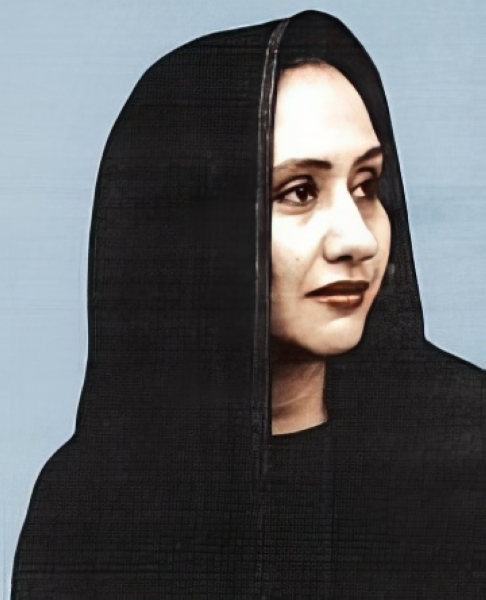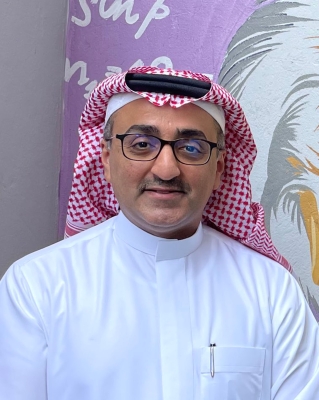
Raja'a Mohammed Alem is a Saudi Arabian novelist and playwright. She is the first Arab woman to win the International Prize for Arabic Fiction (the Arabic Booker) and the second from Saudi Arabia after the novelist Abdo Khal. She is one of the pioneers of Saudi women's literature and a representative of experimental literature in the Kingdom.
She invented a unique literary language, which reflects her deep attachment to Makkah. Her narrative worlds delve into the spiritual, historical, and geographical depths of the Holy Capital. She has received nine creative awards in the Kingdom and other countries, e.g., Kuwait, Spain, and France. She has published around eighteen books, including novels, plays, and co-authoring. Some of her works are translated into Spanish and English.
Beginnings of Raja'a Alem
Raja'a Alem, a native of Makkah, received her bachelor's degree in English Literature from King Abdulaziz University. Prior to completing the degree, she showcased her talent by publishing her debut novel, titled Four Zero, in 1982 through the Literary and Cultural Club in Jeddah. Following her graduation, she embarked on a career in education, all the while dedicating herself to her authoring endeavors. Her written contributions were regularly featured in the cultural section of the al-Riyadh newspaper, and she also co-founded a cultural center in Makkah al-Mukarramah alongside her sister, Shadia Alem. The purpose of this cultural center was to empower women in underserved areas and elevate their levels of awareness and knowledge.
Raja'a Alem's Language
Raja'a Alem is primarily recognized as a novelist, having penned her first novel in the early 1980s. However, from 1987 onwards, she delved into the realm of experimental theater and started publishing theatrical texts. One of her notable works in this genre is the text of Dancing on the Tines of the Fork, which garnered her accolades such as the Jawhar al-Salem Prize for Playwright in Kuwait. Her texts exhibit an inclination towards unexplored narrative realms that are steeped in the history, legends, and philosophy of Makkah. Makkah serves as a prominent wellspring of inspiration in her creative endeavors. Furthermore, her language is known for its affinity with Sufi texts, inviting readers to delve deeper into deciphering their codes and grasping their profound meanings, which often demand additional effort and spiritual depth.
Awards Won by Raja'a Alem
She participated in international cultural events, such as the International Book Festival for Reading in Canada in 2002, the Conference on Expressing Saudi Women in France in 2003, the Book Fair in Germany in 2004, and the Colors of the Kingdom Exhibition in Spain in 2005. She received the Creative Achievement Award from al-Yamamah Press Foundation and Jeddah Literary and Cultural Club Award.
In 2005, she received a book award from a newspaper. She also received an award from the United Nations Educational, Scientific and Cultural Organization (UNESCO) on the occasion of the sixtieth anniversary of UNESCO's establishment in recognition of her active role in fostering the creativity of Arab women. She was awarded the Medal of Honor in Ibn Tufail Novel Competition by the Western Spanish Cultural Center in Madrid. In 2008, she was named the winner of the Arab Creativity Award by the Lebanese Cultural Forum in Paris.
Raja'a Alem Wins the Arabic Booker
Raja'a Alem achieved a groundbreaking milestone in 2011 when she won the prestigious International Prize for Arabic Fiction for her novel, The Dove's Necklace. This remarkable achievement made her the first Saudi Arabian and Arab woman to receive the esteemed Arabic Booker Prize. It was also the first time in the history of the Prize that a joint victory had occurred. In her novel, Makkah took center stage as the narrative setting, exploring a comprehensive web of religious, historical, and societal values. The boundaries between reality and imagination blurred, resulting in a richly symbolic and experimental novel.
Raja'a Alem Publications
Raja'a Alam published her novels over twenty-nine years. In 1995, she released her second novel titled "Silk Road" in Beirut, followed by "Sidi Wahdanah" in 1998, then "Hobba" in 2000, "Mawqad al-Tayr" in 2002, "Sitr" in 2005, "Khatim" in 2007, "Dove's Collar" in 2010. She also published two novels in English titled "Fatma" and "My Thousand & One Nights." Additionally, she published three books in theatrical literature, namely "Holes in the Back," "Dancing on the Tines of the Fork," and "The Final Death of the Actor."
Collaborative Works with Raja'a Alem
Raja'a Alem and her sister, the artist Shadia Alem, formed a dynamic duo in the realm of culture and art. Their collaborative endeavors included co-authoring the book "Masra Ya Raqib" in 1996 and the book "Ain Jah" and "Jinnyat Lar." They actively engaged in various other collaborations, such as co-authoring "Ayat wa Ayat" with Najah al-Mahdawi and "Maratib al-Ishq" with another collaborator. Additionally, Raja Alem ventured into an artistic project with American photographer Wendy Ewald, directing a collection of captivating artistic photographs. In 2014, she received the Book Award as part of the Frankfurt Book Fair.
Related quizzes
Related articles


